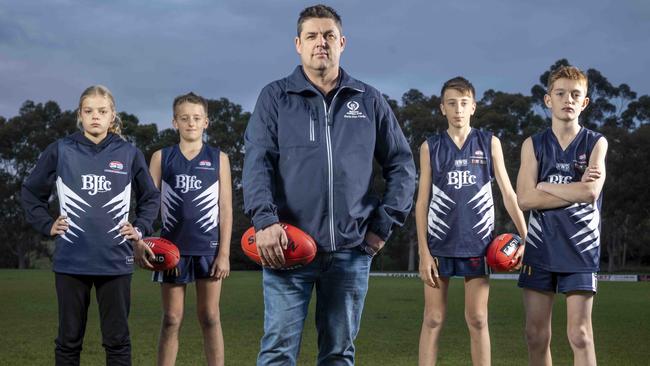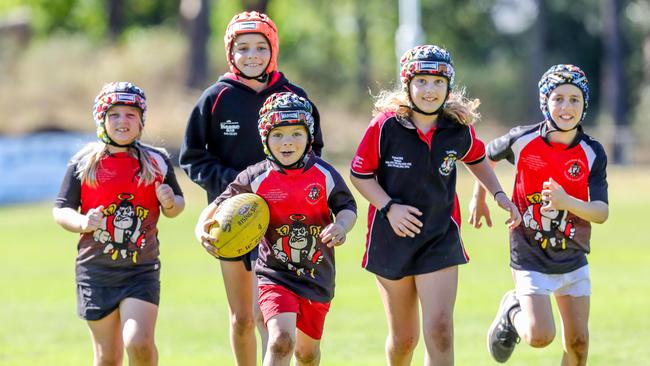Australian Sports Foundation study reveals the deepening problems with sport in the country
It’s no secret that Australia is struggling to keep up with other high-performing countries on the global stage – but a nationwide study reveals just how deep the problem goes.
Sport
Don't miss out on the headlines from Sport. Followed categories will be added to My News.
So much for Australia’s reputation as a sports-loving country.
The shocking results from a new, national study have completely debunked that old wives’ tale – revealing how the deepening problems with sport in Australia are spiralling out of control
It’s no secret that Australia is struggling to keep up with other high-performing countries on the global stage – but a recent health check of community and grassroots sports has exposed just how far the problem goes.
If local sports are the bedrock for higher success and the glue that keeps communities together, then this is the clearest warning sign yet that Australia faces a bleak future because grassroots clubs are dying at a faster rate than ever before.
The alarming findings come from a recent survey conducted by the Australian Sports Foundation (ASF) that paints a harrowing picture of the health of the country‘s bread and butter clubs.

ASF chief executive Patrick Walker said the findings from the survey were a wake up call for everyone who cares about Australian sport.
He said the biggest red flags were the rising threat of community clubs closing down – which had more than doubled in the last year alone from one in 10 to one in four – and the reduction in teenagers playing sport, but that was just the tip of the iceberg.
“If these clubs close down in anything like those kinds of numbers, it would leave a massive hole in social life and in communities all over Australia so that concerns us,” Walker said.
“Then, the teenager participation issue is also a big concern. If people drop out of sport when they‘re a teenager, they’re very unlikely to pick it up again in later life.
“And that brings all sorts of problems, with health and lack of physical activity and social cohesion.
“But it also calls into question the future sustainability of these clubs, because what happens in ten, 20 years time?”
Once the bedrock of Australia’s sporting success, the problems that community clubs face is not new.
While the biggest professional clubs have gotten richer and richer, grassroots sports have suffered, especially in regional and rural areas.
But it’s the rapid decline since Covid that has really worried the ASF, a non-profit body that is dedicated to helping athletes, sporting clubs and organisations raise funds.

Walker said all the vital signs were trending in the wrong direction.
Of the one-in-four small clubs, with less than 200 members, that are on the verge of being shut down, more than half are in regional or remote areas, so any closures will have a deep impact on their local communities.
More than two-thirds of all clubs are facing increased expenses since the pandemic, with insurance premiums the biggest cause for rising costs.
Of the almost 3,000 clubs that participated in the survey, 27% reported a drop in the number of 15-19 years sticking with sport.
A quarter of all clubs have also experienced a sharp reduction in the number of volunteers, which has placed a greater workload on administrators and committee members.
The ASF already works with philanthropists to raise funds and helps clubs and individuals through various methods, including crowd-funding on its own tax-deductible platforms.
The foundation is not putting its hand out asking for a government bailout, but wants to help raise awareness about the escalating issues sports clubs face.
“I don‘t think there is a magic wand,” Walker said.
“One of the reasons we want to continue doing this report and this annual survey is to shine a light on this really important base of the pyramid, which is the foundation of Australia‘s sporting ecosystem because this is where it all starts.
“Every champion of the future will start at a grassroots club so we want to shine the light.
“Our role as the ASF is to bring philanthropic money to help address some of the financial problems.”

Despite the gloomy trends, there are some encouraging signs.
Australians are already generous supporters of sport – with the ASF raising $77 million in philanthropic donations in the 2022 financial year.
Those funds have been used for everything from sending Australian teams to international competitions, to rebuilding clubhouses and facilities destroyed by floods and bushfires to paying for team uniforms – but there’s always more to be done.
“One of the issues is that sport is very, very fragmented in Australia,” Walker said.
“I think the ecosystem needs to be looked at holistically and all parts of the ecosystem need to be healthy.
“Not enough parts of sport are talking about the issues at the grassroots and community level because it‘s far more glamorous to talk about elite athletes and Olympic Games, Paralympic and Commonwealth Games.
“They are great things but our point is that without a healthy base, those will wither so it‘s important the entire ecosystem is looked at, not just the glamorous, shiny stuff at the top.”
More Coverage
Originally published as Australian Sports Foundation study reveals the deepening problems with sport in the country





